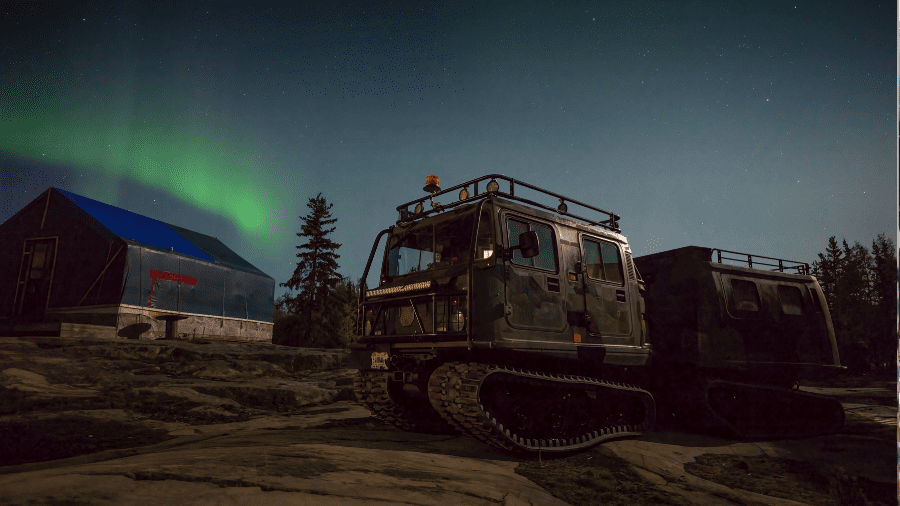By Stephen Van Dine, February 10, 2023
Budget 2023 is around the corner and there is no shortage of issues requiring attention and resources. Cost of living, the state of health care as well as the growing demands on an over-stretched and under-equipped military are all vying for pride of place in Finance Minister Chrystia Freeland’s third budget. With the bulk of voters living in densely populated regions of the country, it is unlikely the Canadian Arctic with its 150,000 residents will receive much budget attention. But that would be short-sighted.
Why? Because the North’s vast mineral potential, not to mention natural gas and hydro, can help transform Canada’s economy to net zero faster and create meaningful jobs and wealth across the country with every dollar spent.
Any northern construction or purchasing requires access to out-of-territory providers. Projects large and small, such as pipeline construction or the opening of a new mine, generate massive demand for steel from Hamilton, logistics and transportation from Alberta, British Columbia or Manitoba, and workers from across the country.
Historically, northern development efforts have been uneven. Mary Simon, as Ministerial Representative to Minister Carolyn Bennett, wrote about the shortfalls of northern development policies emanating from boardrooms in Ottawa. In her 2017 report, A new Shared Arctic Leadership Model, she outlined the ingredients for a new Arctic and Northern Policy Framework that would be cooperatively developed with the governments and the Indigenous organizations that call Canada’s North and Arctic home.
As Simon identified, northern development policies seldom considered the views of those who lived there. From pre-Confederation fur trading, to the expansion of “responsible government” and creation of provinces and territories (Alberta, Saskatchewan and Yukon in 1905), to “roads to resources,” to the pursuit of modern treaties with Indigenous peoples, northern development policy was fundamentally an external force laid upon the region’s peoples, communities, wildlife, lands and water.
Northern development brought benefits and costs. The costs varied widely and deeply from physical and environmental damage associated with contaminated mining sites, as well as human and psychological trauma associated by the introduction of illness, residential school policies, forced relocations, sled dog massacres, high addiction rates and violence against women.
Benefits are in the eyes of the beholder. The fur trade created an economy. Responsible government led to programs and services including health care to residents on par with the rest of Canada. And more recently, a greater level of self-reliance and independence through program devolution and negotiated modern treaties and self-government. Northern development has also brought about well-paying public service jobs, current infrastructure as well as diamond mines.
However, the impact of past major northern development decisions are receding with the passage of time and changing demographics. There is a growing void of new ideas to inspire upcoming generations to chase the promise Canada’s North continues to hold.
Diamond mines are reaching their twilight and closures are being planned for. Almost 40 years have passed since the Inuvialuit Land Claim has been settled, and Yukon devolution will mark its 20-year anniversary this year. Population growth remains marginal and economic development is sluggish. Public sector spending remains the largest component of GDP, with mining placing a distant second.
The Arctic and Northern Policy Framework (ANPF), released in 2019, changed the definition of northern development. Applying the insights and recommendations from Mary Simon, the federal government co-designed and co-drafted the policy framework that integrated federal objectives with provincial, territorial and Indigenous governments priorities as well as the United Nation’s Sustainable Development Goals. The result is a broad framework and intergovernmental structure to guide investment decisions. Unfortunately, the ANPF is missing one key structural component to make this happen: implementation plans.
Critics of the ANPF call it “empty” of ambitious or even tangible actions or investments.
The government has countered that the ANPF was intended to operate in tandem with implementation plans jointly developed with local, regional and national actors. Yet almost four years later, it’s unclear to what extent that joint planning, let alone implementation, has taken place.
Meanwhile, the federal government has not stood still, making a series of announcements and policy statements now running in parallel to the ANPF. These include the Critical Minerals Strategy, the Defence Policy Review and COP15 conservation targets.
Budget 2023 could reframe the ANPF to incorporate recent federal policy decisions and be an overdue catalyst for clear, strategic and achievable local and regional implementation plans. To this end, the budget should contain three measures:
- Cost-share commitment for local and regional implementation plans by providing 50 percent funds to support northern governments and organizations to get organized, conduct research and develop a shared plan of action;
- Establish a Northern and Arctic development infrastructure reserve and loan guarantee regime to incentive investments in the North; and
- Ensure federal departments identify investment priorities to advance federal interests in the Canadian Arctic including geo-science, remote sensing, defence, search and rescue, trade, marine navigation and scientific research.
Canadians are legitimately worried about their future. The Canadian Arctic holds the potential to inspire the nation once more and bring prosperity to its residents, communities and all Canadians.
By looking north, we can achieve greater progress towards reconciliation and give focus for defending our borders, securing critical minerals, accelerating the transition to low carbon energy systems, and bringing much needed infrastructure investments to remote communities on their terms. An Arctic theme backed by real dollars and plans in Budget 2023 could be just what Canadians need to see.
Stephen Van Dine is the former Assistant Deputy Minister of Northern Affairs for Indigenous and Northern Affairs Canada.






